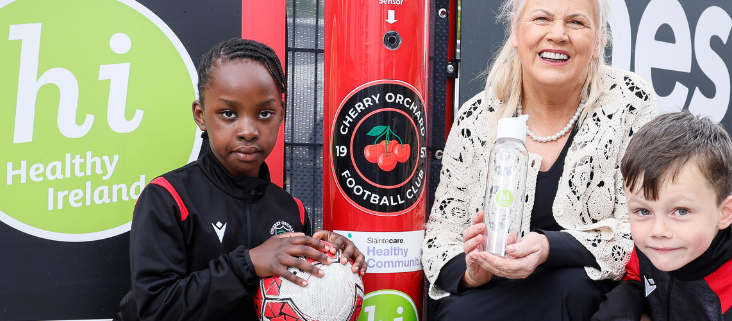Healthy Hydration for Dublin Uisce Cliste Report Launched today
The report details how intervention and education can improve health through hydration
The Healthy Hydration for Dublin Uisce Cliste report, a study into how increasing safe public drinking water and tailored education can support the health of those in disadvantaged areas, was launched today by Minister of State at the Department of Health, Jennifer Murnane O’Connor in Cherry Orchard Football Club, Ballyfermot, Dublin 10.
The launch marks a collaborative effort between RCSI University of Medicine and Health Sciences, Dublin City Council, and the Sláintecare Healthy Communities Programme, as part of the Dublin City Healthy Ireland Strategy 2022–2025, funded by the Department of Health. The research was commissioned by Joanna Kelly, Local Development Officer and Project Lead for the strategy’s design, planning, and implementation.
The study, conducted by Dr. Grace O’Malley, Dr. Desire Naigaga, Dr. Angela Hickey, Dr. Lisa Mellon and Prof. Suzanne McDonough of RCSI University of Medicine and Health Sciences, aimed to assess whether improved access to free high quality drinking water in public spaces would impact knowledge and habits related to drinking water in people living in socioeconomically deprived areas of Dublin. A second aim was to explore the impact on plastic and aluminium waste at the study sites.
Speaking at the event Jennifer Murnane O’Connor TD, Minister of State at the Department of Health with special responsibility for Public Health, Well Being and the National Drugs Strategy, said, “This report reinforces that access to clean drinking water is not only a basic right, but a powerful lever for improving public health. Through authentic community collaboration and targeted interventions, we can support education and find solutions to community challenges. With evidence-based policy we can enhance the built environment to make healthy choices much easier in order to improve health, reduce waste and advance health equity across disadvantaged areas.”
Dublin City’s Healthy Ireland (HIF) strategy 2023-2025 aimed to increase access to drinking water in an effort to enhance health behaviour and hydration knowledge among people living in the Cherry Orchard and Ballyfermot areas. Both areas are part of the Sláintecare Healthy Communities Programme (SHCP) funded by the Department of Health.
Cherry Orchard Football Club and Ballyfermot United Football Club received smart water fountains and club-branded reusable bottles. Cherry Orchard Football club also received the Uisce Cliste intervention which incorporated nine face-to-face education sessions for children, adolescents and adults, recommendations for the tuck-shop menu and educational materials. Following introduction of the Uisce Cliste intervention, hydration-related knowledge and habits improved for children and parents by up to 16% and 18% respectively, over 900 litres of water were used and single-use waste decreased at the club by over 90%.
The findings highlight the importance of developing and implementing policies that guarantee access to safe, clean public drinking water and hydration education across all Irish communities.
Principal investigator, Dr. Grace O’Malley (Senior Lecturer in the School of Physiotherapy, RCSI University of Medicine and Health Sciences) and senior author of the report, said, “It is fantastic to have the opportunity to highlight the importance of hydration for health. Working on the Healthy Hydration for Dublin, Uisce Cliste Project and Report has been so rewarding as we have attempted to support the health of people living in Cherry Orchard and Ballyfermot. The Cherry Orchard Football Club and Ballyfermot United Football Club have been wonderful health advocates for their members. This project is a wonderful start to healthier football clubs and we look forward to many other sports clubs joining the initiative.”
Joanna Kelly, Project Lead and Dublin City Council’s Local Development Officer for Cherry Orchard Ballyfermot added: “This Uisce Cliste Report showcases the real impact of working directly with communities and stakeholders to design meaningful, evidence-informed interventions. It highlights how public realm improvements, combined with education, can drive positive long-term health outcomes in our neighbourhoods.”
Stephen O’Brien, Underage Chairperson at Cherry Orchard Football Club said, “We are always looking for ways to improve the health of those who use our club. Having the knowledge and now the fountains allowed us to make a real impact on the health of our members, and that is something I am very proud of.”
Key Findings:
- 922 litres of water have been dispensed to date through the use of three smart water fountains.
- The nine tailored Uisce Cliste educational sessions were held lasting 40 minutes and delivered to 487 members of Cherry Orchard Football Club (75 adults and 412 children and adolescents) which exceeded the planned goal of reaching 400 members.
- Three key message videos for social media were developed in collaboration with the Uisce Cliste Ambassador Jessie Stapleton (ex Cherry Orchard player and Republic of Ireland Senior Women’s Football Player).
- A total of 338 members of the football clubs consented/assented to participate in the evaluation study.
- Aluminium and plastic waste reduced by 97% between baseline and follow up which exceeded the planned goal to reduce waste by 10%.
Recommendations based on the report:
- National policies are required to ensure that all communities across Ireland have access to free high quality drinking water in the public realm, in addition to usable information regarding healthy hydration.
- Healthy Ireland goals of improved nutrition and addressing health inequalities can be achieved by supporting hydration literacy and optimising access to free high quality drinking water. Other goals such reducing waste and in particular plastic waste will also be supported.
- Further research is required to explore how bespoke healthy hydration interventions can impact hydration related knowledge, behaviours and impacts on health status of populations.
- Future research should examine the Reach, Effectiveness, Availability, Implementation and Maintenance (REAIM) of a national healthy hydration intervention across Ireland.
- An increase in capital funding for sports clubs is needed to support installation of water fountains so that access to free high quality drinking water can be realised for all clubs.
To read the report in full, please find it here.





